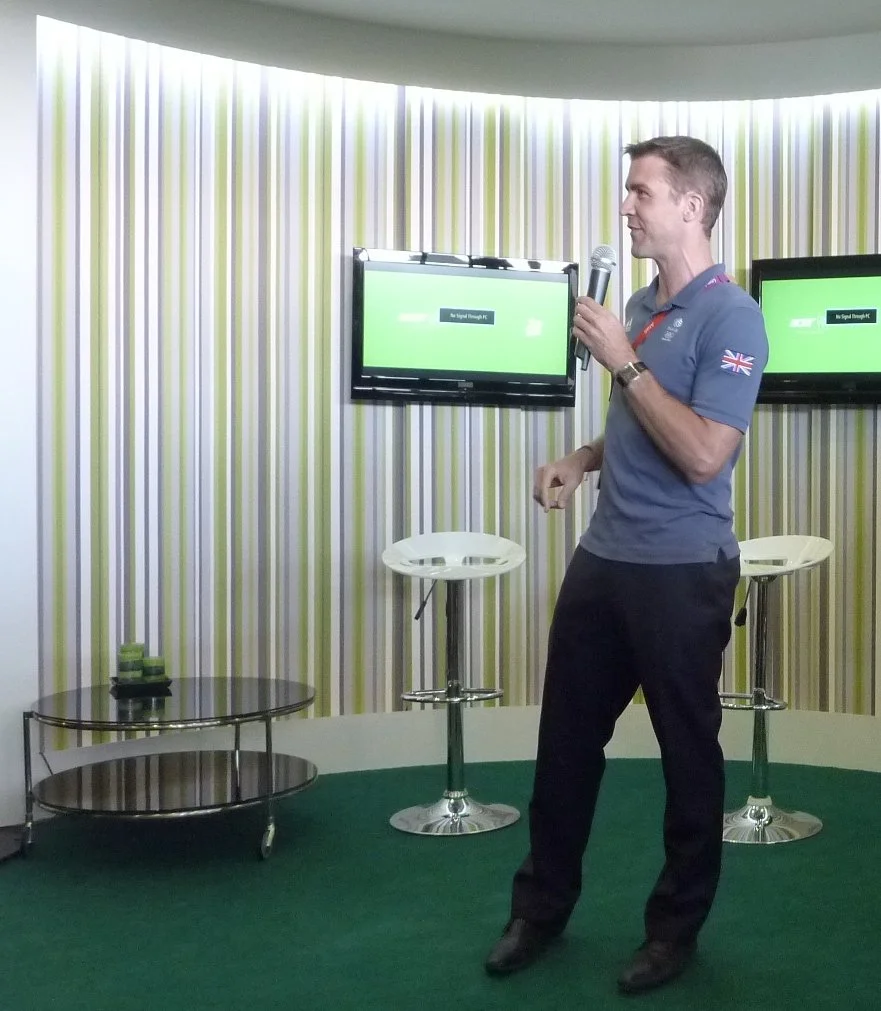During the 2012 Olympics in London I was invited by Acer to a talk in the Olympic Park by Leon Taylor, the champion diver. In this, the second part of the mini-series on lessons from sports, we look at what he had to say about detailed analysis.
Leon Taylor speaking at the Olympic Park
Anyone who voluntarily leaps off a board which is 10 metres high – imaging three double-decker buses stacked on top of each other with a car balancing on top – has to be nuts. That’s not me saying that, but Leon Taylor himself – I just happen to agree! (Sounds like fun though!). It takes just 1.5 seconds to hit the water at 40 miles per hour, and in that time you have to execute a couple of twists in two directions. In his quest to devise the world’s most difficult dive a few years ago, Leon and his coach examined each part of the dive to see how it could be improved and what new elements could be shoehorned in.
The idea of analysing performance is not new to schools, of course. I have come across several that use video in order to help youngsters improve on what they do by providing very visual and accurate feedback. But what struck me about Leon’s comments was that he analysed his performance in minute detail. I don’t know if they used video (I imagine they did, otherwise how else could they have done it?), but looking at each section is markedly different from simply playing the video over and over. In the swimming, to take a different sport, contestants win or lose by times measured in hundredths of a second. Detail counts.
So THIS is where they practise!
I first came across this painstaking analytical approach many moons ago when the film Saturday Night Fever came out. Back in the 70s, video was a fairly new thing, and being new it was expensive, and also not as good as today, especially when it came to pausing the action. If you pressed Pause, it would take a second or two for the player to react, which usually meant it went past the bit you actually wanted to see. So that meant video wasn’t an easy option for undertaking detailed analysis. But that wouldn’t necessarily deter the person determined to really understand what was going on in a particular field. At that time I met someone who taught in a dance school, and he had been to see Saturday Night Fever something like 40 times. He would sit through the film making detailed notes on the dance moves, and did that repeatedly until he had a complete picture of how the dances were constructed.
That sort of detailed and deep analysis should count in Computing as well. In addition to the use of video, there are other areas in which this approach can be applied. For example, if a macro or other kind of programming is not behaving how you expect it to or want it to, there is no point in merely running it over and over again because it all goes so fast. You need to use something called Step Mode, or its equivalent. As the term suggests, Step Mode executes the code one step at a time, so you can see the exact line on which it crashes or does something you don’t want, or fails to do something you do want.
This attention to detail applies in other ways too, such as asking questions. See, for example, the article on being persistent. It applies not just in the “post-production” phase but also in the planning and execution stages. In fact, if you think about it, the rule of detailed analysis ties in very closely with the 1% improvement rule. By analysing exactly what is going on, and how each part of a process or product is interacting with other parts, you can take targetted steps to improve it, and this applies as much in Computing as it does in sport.
If you found this article interesting, please consider subscribing to my free newsletter, Digital Education.



